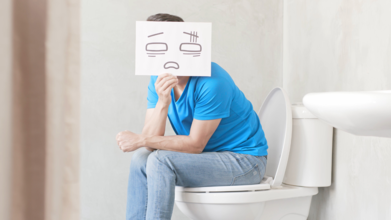- Health Conditions A-Z
- Health & Wellness
- Nutrition
- Fitness
- Health News
- Ayurveda
- Videos
- Medicine A-Z
- Parenting
- Web Stories
Can Ozempic Treat Arthritis Related Knee-Pain ? New Study Say Yes

Ozempic And Knee Pain (Credit: Canva)
As Ozempic continues to trigger controversy due to its use as a weight loss drug, research has found that semaglutide injections can reduce knee pain caused by obesity-related arthritis. This could, in turn, make everyday activities like walking easier for arthritis patients. Semaglutide is a GLP-1 receptor agonist, a class of drugs that helps regulate blood sugar, control appetite, and promote weight loss. Ozempic is one of the forms of this drug.
Trial Showed Significant Pain Relief In Participants
The recent trial published in the New England Journal of Medicine examined the effects of semaglutide on obesity-related pain. Approximately 400 participants from 11 countries were given either weekly semaglutide injections or a placebo, along with advice on healthy eating and exercise. Initially, participants reported an average pain score of 71 out of 100, reflecting considerable discomfort when walking. After 68 weeks, those who received semaglutide experienced an average pain reduction of 42 points, significantly higher than the 28-point decrease observed in the placebo group. The findings suggest that semaglutide could offer notable pain relief for individuals with obesity, improving mobility and quality of life.The researchers concluded that the drug's pain relief was due to its anti-inflammatory properties combined with weight loss. As a person loses weight, the strain on their knees reduces considerably. Dr Henning Bliddal, a rheumatologist who co-led the trial, noted that the treatment was so effective that some participants no longer qualified for the study due to reduced pain levels.
Semaglutide And Its Side Effects
Semaglutide, marketed under the brand name Ozempic, is primarily an antidiabetic medication used to treat Type 2 diabetes. It is also an anti-obesity drug used for long-term weight management. While it can be taken as a subcutaneous injection or orally, it has significant side effects. It primarily impacts your gastrointestinal tract and its side effects include constipation, nausea, abdominal pain, diarrhoea, and fatigue amongst others.Arthritis is a common health condition that causes joint inflammation, pain, swelling, stiffness, and limited movement in people. It is a cluster of auto-immune diseases, which means that our body recognizes ourselves as "foreign" and hence attacks itself.
How To Recognise Arithititis?
In this case, a person feels inflammation in the joints, which leads to various symptoms like:
1. Joint Pain: Persistent pain in the affected joints, which may worsen with movement or after periods of inactivity.
2. Stiffness: Reduced flexibility and stiffness, especially noticeable in the morning or after sitting for long periods.
3. Swelling: Inflammation in the joints can cause noticeable swelling and warmth in the affected areas.
4. Redness: Skin over the affected joint may appear red and feel warm to the touch.
5. Decreased Range of Motion: Difficulty moving the joint through its full range of motion.
6. Fatigue: General tiredness or a feeling of low energy, which can accompany joint pain.
7. Nodules: Hard lumps may form under the skin near the affected joints in some types of arthritis, such as rheumatoid arthritis.
Harvard Psychologist Lists Careers Linked To Higher Rates Of Suicide: Doctors Maybe At High Risk Themselves

(Credit- Canva)
Suicides are one of the leading causes of death around the world. While it is easy to say that the person who chose to take their lives did it of their own violation, Harvard psychologist Dr. Matthew Nock, explains the other side. “90% of people who try and kill themselves say, I didn't want to die per se. I wanted to escape from seemingly intolerable.” Speaking on the On Purpose podcast with Jay Shetty, Dr. Nock pointed out that the link between work pressure and suicidal thoughts varies by race and ethnicity.
The concerning rise in suicide cases tied to work pressure has fueled a social media conversation about toxic work culture. What was once considered a normal part of the professional grind is now being openly challenged, as people share personal stories of the anxiety, depression, and isolation caused by unhealthy work environments.
What Professions Are At High Risk Of Suicide?
According to Dr. Matthew Nock, certain careers are linked to a higher risk of suicide.
Police Officers
He noted that physicians and police officers are among those at high risk. He mentioned a spike in suicides among New York City police officers, who are predominantly white men, and shared that female police officers, in particular, face a higher risk, even when accounting for factors like age, race, and ethnicity.
According to a 2025 study published in the Police Practice and Research, on average, 21.4 out of every 100,000 officers died by suicide each year.
The study showed that the suicide rate was much higher for male officers (22.7 per 100,000) than for female officers (12.7 per 100,000).
Physicians
Dr. Nock explained that access to means is a significant factor in these high-risk professions, which helps explain why physicians, police officers, and military members have a much higher risk of suicide compared to others.
Another study published in 2024 The BMJ, showed that the number of suicides among doctors has been going down, female doctors are still at a much higher risk than other people.
When looking at all the data, male doctors were found to have a 5% higher risk of suicide compared to the general population.
In a more recent analysis of the last few years, the overall suicide rate for doctors has decreased, which is good news. But even with this improvement, female doctors still have a 24% higher risk than the general public.
Why We Need To Talk More About Suicide
Dr. Nock stresses the importance of openly discussing suicide, particularly in schools. He compared it to fire drills or earthquake preparedness, saying that since 15% of people will experience suicidal thoughts, it's crucial to equip everyone with a safety plan..Dr. Matthew Nock said, "We know that asking about suicide, talking about suicide, does not make people suicidal."
He noted that the people who act on suicidal thoughts often show different signs than those who just have the thoughts. While depression is a strong predictor of having suicidal thoughts, other factors like anxiety, aggressiveness, poor behavioral control, and drug or alcohol use are more closely linked to a person actually attempting suicide.
He believes that a small educational module on suicide in health class could help save lives by teaching people what to do if they or someone they know is struggling.
Lung Cancer Rates Linked With Pollution Are Down In US, But THIS Country Is Still Suffering: Study

(Credit- Canva)
While we all know air pollution affects our health, did you know that it was actually driving cancer cases higher? This has led to a big rise in health problems worldwide. Past studies show that air pollution is linked to about seven million premature deaths each year and contributes to over 3% of all years of healthy life lost globally. This revelation was a big concern for public health, and to fix it, many measures were taken.
While some countries like the US showed promising results in bettering public health, a recent study in the International Journal of Public Health showed that this positive trend is not yet showed up in China.
How Is PM2 Pollution Affecting Our Health?
One of the most dangerous types of air pollution is called fine particulate matter, or PM2.5. These tiny particles come from car exhaust, factory smoke, and even from the smoke created by burning solid fuels inside homes. Because they are so incredibly small, they can stay suspended in the air for a long time and, when we breathe them in, they go deep into our lungs.
Once inside the body, PM2.5 can cause inflammation and even change our genes, which increases our risk for many illnesses, especially tracheal, bronchial, and lung (TBL) cancers. A new study looked at how much PM2.5 pollution has affected TBL cancer rates in China, Japan, South Korea, and the United States from 1990 to 2021.
Has Pollution-Related Health Risk Decreased Everywhere?
The study, which used data from the Global Burden of Disease (GBD) project, found some important trends:
Overall Cancer Rates Are Declining
The good news is that globally, the number of deaths and years of healthy life lost due to TBL cancer linked to PM2.5 pollution are going down. This positive trend was consistent in all the countries studied: China, Japan, South Korea, and the U.S.
China's Unique Challenge
Despite this global trend, China faced a much higher death rate from TBL cancer linked to PM2.5 compared to the other three countries. While their rates are decreasing, they still remain significantly higher than the worldwide average.
Household Pollution Hits Women Harder
The research also looked at pollution from burning solid fuels inside homes. The global death rate from TBL cancer linked to this type of pollution has remained stable, but it's actually increasing for women while it's decreasing for men. This highlights a specific danger for women in homes that rely on these fuels.
Will This Pollution Cancer Trend Keep Rising?
Looking ahead, researchers predict that the global death rate for TBL cancer caused by PM2.5 will actually increase over the next 29 years. However, the study notes that countries like China, South Korea, and the U.S. are expected to see a significant drop in their rates, while Japan's numbers are expected to stay about the same.
Overall, this study shows that while air pollution is a serious global health risk, the efforts to reduce PM2.5 exposure in many countries are making a real, positive difference.
'You’ve Been Pooping Wrong All Your Life' According To Harvard Gut Doctor, 3 Mistakes That Harm Your Health

(Credit- Canva)
Maintaining our gut health is not as easy as it seems. Even things like how you do your bowel movements could reveal how healthy your gut actually is. According to Dr. Saurabh Sethi, a board-certified gastroenterologist, many of us are making common mistakes on the toilet that can lead to real health problems. Here are three crucial habits to change to improve your gut health. Here are three mistakes' people make will they are in the washroom.
3 Bathroom Mistakes You Are Making
Stop Straining
Pushing or straining when you poop can cause serious issues like hemorrhoids, which are swollen veins in your rectum and anus, and anal fissures, which are small tears in the lining of your anus. In more severe cases, it can even lead to rectal prolapse, where part of the rectum slides out of the anus. Instead of forcing it, focus on taking deep breaths. This helps your abdominal muscles relax and allows your body to do its job naturally, reducing the risk of painful complications.
Put Down Your Phone
Scrolling on your phone while on the toilet can be a bad habit. Spending extra time on the toilet, even if you’re not straining, puts pressure on the delicate veins in your rectum. This can cause them to swell, significantly increasing your risk of hemorrhoids. To protect yourself, it’s best to keep your bathroom breaks short—ideally, under five minutes.
Don't Ignore the Urge
When you feel the need to poop, it's important not to hold it in, which makes it much more difficult to pass later, leading to and worsening constipation. When you feel the need to go, listen to your body. Holding it in causes your stool to get harder and drier, which makes constipation much worse and more painful later on. Train your gut to go when it says it's time.
Simple Ways To Improve Your Bowel Movements
Go at the Same Time Each Day
Try to create a routine. If you're often straining without success, try sitting on the toilet about 30-60 minutes after a meal, when your colon is naturally more active. A little stretching or a short walk beforehand can also help things get moving.
Use a Stool for Your Feet
The natural position for a bowel movement is squatting. You can mimic this position on a regular toilet by placing a small stool under your feet to raise your knees above your hips. This simple change helps your muscles relax and can make bowel movements easier and more complete.
Focus on Fiber and Fluids
Fiber is essential for creating soft stool that's easy to pass. Most adults should aim for 25 to 35 grams a day. Just remember to add it to your diet slowly. As you increase your fiber, be sure to drink more water and other non-caffeinated fluids, since caffeine can dehydrate you and make stool harder.
When to Seek Help
While these tips are a great starting point, sometimes you need more personalized help. You should talk to your doctor if you notice any of these signs:
- A recent, unexplained change in your bowel habits
- Blood in your stool
- Unexplained stomach pain
- A pelvic health physical therapist can also provide a full evaluation and create a personalized plan to improve your bowel health.
© 2024 Bennett, Coleman & Company Limited

